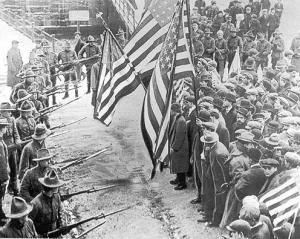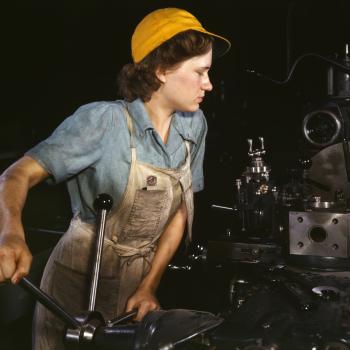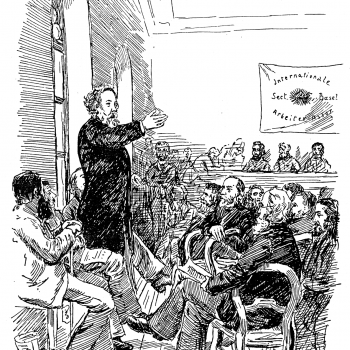In a previous offering in these pages [1] your humble servant did his level best to explain that leaving wages to market forces is not in accord with Catholic social teaching. As Pope Leo XIII explained in his landmark encyclical, Rerum novarum,
“Let the working man and the employer make free agreements, and in particular let them agree freely as to the wages; nevertheless, there underlies a dictate of natural justice more imperious and ancient than any bargain between man and man, namely, that wages ought not to be insufficient to support a frugal and well-behaved wage-earner. If through necessity or fear of a worse evil the workman accept harder conditions because an employer or contractor will afford him no better, he is made the victim of force and injustice.” (Rerum novarum, §45) [2]
 Now as strange as it may seem, there are those who take issue with this idea, all the more so when it is brought to their attention that the Pope’s idea of a wage sufficient “to support a frugal and well-behaved wage-earner” involved compensation that was enough “to enable him comfortably to support himself, his wife, and his children….” (Ibid, §46) Some jobs, it is said, are really for schoolkids, who, since they are living with their parents in the suburbs, and will be spending the money on compact discs, do not need so much.
Now as strange as it may seem, there are those who take issue with this idea, all the more so when it is brought to their attention that the Pope’s idea of a wage sufficient “to support a frugal and well-behaved wage-earner” involved compensation that was enough “to enable him comfortably to support himself, his wife, and his children….” (Ibid, §46) Some jobs, it is said, are really for schoolkids, who, since they are living with their parents in the suburbs, and will be spending the money on compact discs, do not need so much.
Those who are blessed enough to avoid fast food never see the number of full-on adults that work in those places. Moreover, there seems to be some who are unaware that sometimes people live with their parents because they have taken on the care of their mother or father. Such is the anesthetization of those who don’t get out very often.
But there is another, more serious objection that bears some discussion, and it is put in the form of a question: How are we to determine what a just wage is? More specifically, how does government decide what the proper minimum wage is? A living, family wage will be different in various parts of the country. How does the government establish a just wage that applies everywhere?
The answer is: it doesn’t. Pope Leo XIII said that in “these and similar questions, however – such as, for example, the hours of labor in different trades, the sanitary precautions to be observed in factories and workshops, etc. – in order to supersede undue interference on the part of the State, especially as circumstances, times, and localities differ so widely, it is advisable that recourse be had to societies or boards such as We shall mention presently, or to some other mode of safeguarding the interests of the wage-earners; the State being appealed to, should circumstances require, for its sanction and protection.” (Ibid, §45)
 The “societies or boards” the Pontiff was referring to were labor unions. “Such unions,” he said, should be suited to the requirements of this our age – an age of wider education, of different habits, and of far more numerous requirements in daily life. It is gratifying to know that there are actually in existence not a few associations of this nature, consisting either of workmen alone, or of workmen and employers together, but it were greatly to be desired that they should become more numerous and more efficient.”
The “societies or boards” the Pontiff was referring to were labor unions. “Such unions,” he said, should be suited to the requirements of this our age – an age of wider education, of different habits, and of far more numerous requirements in daily life. It is gratifying to know that there are actually in existence not a few associations of this nature, consisting either of workmen alone, or of workmen and employers together, but it were greatly to be desired that they should become more numerous and more efficient.”
In keeping with the principle of subsidiarity, what wages are just should be worked out between employers and employees themselves, but with the employees afforded through unions a bargaining power equal to that of their employers. Representation by a union provides a notable benefit when it comes to compensation. Wages and benefits for union workers are consistently higher than that of their non-union counterparts. [3] “Among full-time wage and salary workers, union members had median usual weekly earnings of $1,041 in 2017, while those who were not union members had median weekly earnings of $829.” [4]
Unfortunately, the percentage of wage or salary employees in the United States who are members of unions stands at only 10.7 percent. Along with Pope Leo XIII, we should want this number to increase significantly. Indeed, we could rid ourselves of the scourge of poverty wages if every employee was able to benefit from union representation.
The icon of St. Joseph the Worker is by Daniel Nichols.
Please go like Christian Democracy on Facebook here. Join the discussion on Catholic social teaching here.












